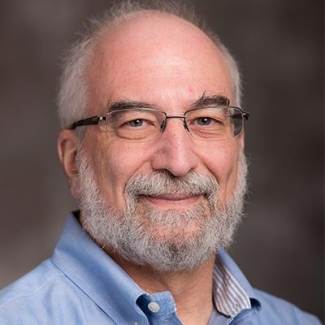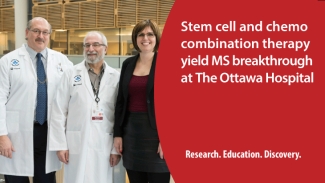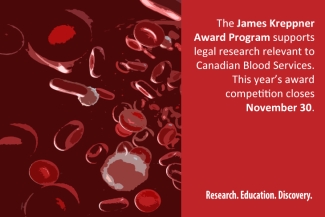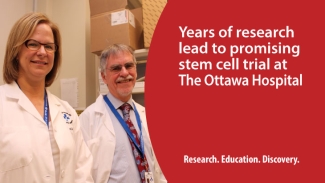Stem cell transplantation pioneer wins lifetime achievement award
Thursday, September 26, 2019 Catherine Lewis
With a focus on improving the lives of patients living with autoimmune diseases, transplant physician and scientist Dr. Harold Atkins has dedicated his career to discovering innovative methods for stem cell transplantation.
In the late 1990s, Dr. Atkins and neurologist Dr. Mark Freedman proposed a novel way to stop the progression of early aggressive multiple sclerosis (MS) by completely wiping out a patient’s immune system, followed by a stem cell transplant. Their idea was first received with skepticism by the medical community.
In 2016, however, The Lancet (one of the most prestigious peer-reviewed medical journals in the world) published their landmark study, which had followed patients for up to 13 years and demonstrated outstanding results: Atkins and Freedman had been able to achieve long-term suppression of all MS-related inflammation, most patients’ disabilities had stabilized, and some patients had even regained abilities they previously lost.
This therapeutic procedure, known as immunoablation and autologous hematopoietic stem cell transplantation (IAHSCT), continues to be studied by the medical community worldwide. Today, there is a network of physicians across the U.S. and Europe who are tracking about 1,000 IAHSCT patients. Dr. Atkins has also pioneered work using IAHSCT for two other rare autoimmune disorders: myasthenia gravis and stiff person syndrome. So far, studies have shown great promise.
Canadian Blood Services' stem cell manufacturing program supported the clinical trial, and continues to support treatments. The blood stem cells used in the clinical trial were autologous, meaning they were collected from the participants themselves. Canadian Blood Services staff on site at the Ottawa Hospital collected the stem cells (mobilized from the bone marrow into the blood and collected by an apheresis procedure), and then shipped them to Canadian Blood Services’ stem cell manufacturing facility for processing.
In recognition for his achievements, Dr. Atkins received Canadian Blood Services' Lifetime Achievement Award at the annual Honouring Canada's Lifeline event in Ottawa on Sept. 23.
In addition to his work as a physician at the Ottawa Hospital Blood and Marrow Transplant Program, Dr. Atkins is an associate professor of medicine at the University of Ottawa, a scientist in the Centre for Innovative Cancer Research and the medical director of the Regenerative Medicine Program at the Ottawa Hospital Research Institute.
Canadian Blood Services – Driving world-class innovation
Through discovery, development and applied research, Canadian Blood Services drives world-class innovation in blood transfusion, cellular therapy and transplantation—bringing clarity and insight to an increasingly complex healthcare future. Our dedicated research team and extended network of partners engage in exploratory and applied research to create new knowledge, inform and enhance best practices, contribute to the development of new services and technologies, and build capacity through training and collaboration. Find out more about our research impact.
The opinions reflected in this post are those of the author and do not necessarily reflect the opinions of Canadian Blood Services nor do they reflect the views of Health Canada or any other funding agency.
Related blog posts
On June 9, The Ottawa Hospital announced an exciting breakthrough treatment for some MS patients. The clinical trial , supported by our autologous stem cell program, was just published in The Lancet and has received world-wide media attention.
The James Kreppner Award Program supports legal research relevant to Canadian Blood Services. This year’s award competition closes November 30.
Led by The Ottawa Hospital, a groundbreaking trial called Cellular Immunotherapy for Septic Shock is testing the idea that mesenchymal stem cells may be able to help control the body’s immune system to reduce injury and promote healing, while improving its ability to fight infection.



